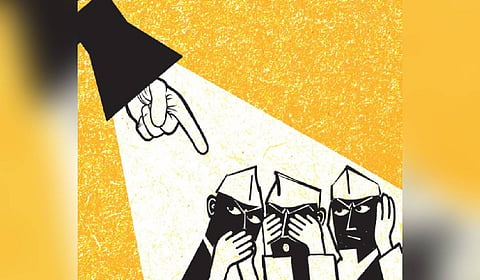It’s time for politics to rise from the depths
In the hoary past, teaching had a different flavour. For one, there were few technical aids. In most schools and colleges, a globe and some maps, and a few posters stretched the limits of the visual aids that teachers could seek help from. Often, debates and elocution contests were conducted as the only way to expand the general knowledge of students.
Another such exercise was the setting up of and holding a Model Parliament, or a Model Lok Sabha. Much excitement would usher in the process of dividing the groups into political parties, allocating ministries and choosing, among others, the students who would be the Prime Minister and the honourable Speaker, respectively.
By the time the exercise rolled out, every ‘minister’ and ‘member’ of the Lok Sabha would have been tutored about his or her duties, obligations, and also the importance of decorum. Saying anything ‘unparliamentary’ in the House could earn a severe reprimand, and repeated offenders were warned of expulsion and a divesting of portfolio in case they held any post.
Despite that, the Model Lok Sabha would often be rocked by heated discussions. Most times, though, limits were not crossed, and members seldom behaved badly enough to deserve being sent out. It was all great fun and serious learning happened in the process, feeding the mind, and teaching young people to hold back tempers, give the opposite side a chance to say what had to be said, and respond to it in a civil manner. Argument and logic, reason and patience were the key factors that had to be understood and brought into play.
If schools and colleges still carry on this practice, the students must feel that the rules of decorous parliamentary behaviour are pure fiction; seeing as one does what happens inside the hallowed halls where laws are made and acts of government are debated on. They cannot be blamed if they think this is how the business of governance is conducted, and adopt the same methods when, later in life, they take up jobs and rise to positions of power.
But worse still is the fact that, even outside the halls, respected members elected to be part of the governance, let themselves be carried away by emotions to spew venom and hate. Little realising that their behaviour loses the respect of a younger populace that is still possibly idealistic enough to put leaders on a pedestal.
Often, in the hate war that parties wage against one another, the speeches that spew forth give the impression that it is absolutely fine to feel such violent hate and express it in public. That wishing an opponent dead, or offering to reward a person to fell a political ‘enemy’ is part of the game. That all, including the most heinous acts, are ‘fair in war.’ That today there is little to differentiate in the behaviour of elected members of political parties from that of members of terrorist organisations or the underworld. And this is not related to just one part of the world; so many countries have abandoned good manners and adopted hate and bad language as the norm.
Perhaps, future generations of political leaders could be different. If they were forced to go through a training programme before they contested, and again after they were chosen. Science fiction… that’s what this sounds like. But so much of what was fantastical science fiction has come to be true. This too might come to pass.
After all with politics having touched the bottom of a murky depth, where can it go, except upwards?
Sathya Saran
Author & Consulting Editor, Penguin Random House
saran.sathya@gmail.com

